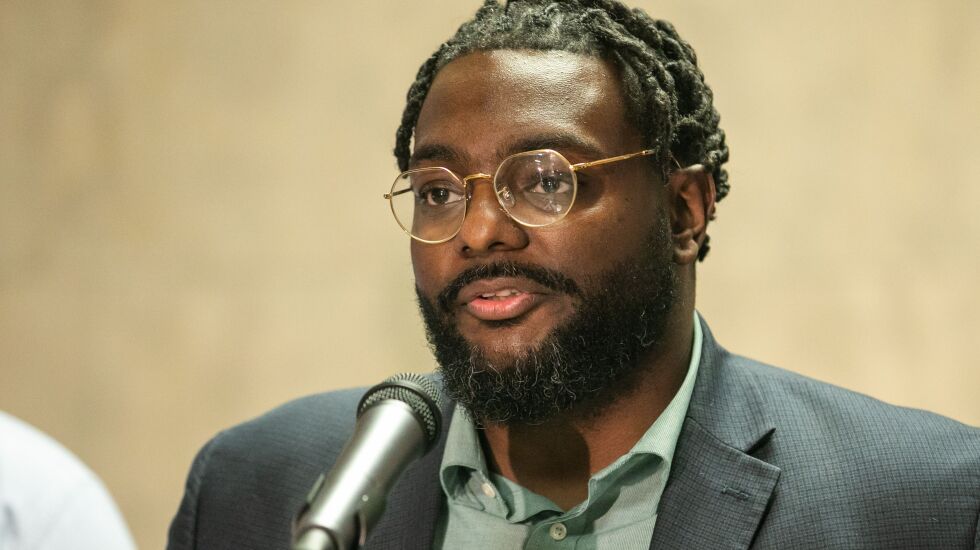
The man who led the nationwide search for Chicago’s next police superintendent on Friday sang the praises of the three finalists and said he has a favorite among them, but refused to name that leading candidate.
Anthony Driver, president of Chicago’s Community Commission for Public Safety and Accountability, said he is “very, very, very exhausted” after spending 70 hours a week searching for the “generational leader” that a city “in crisis” desperately needs.
Driver is convinced he has found three of those leaders in Madison, Wisconsin police chief Shon Barnes, the Chicago Police Department’s Counterterrorism chief Larry Snelling and Angel Novalez, CPD’s head of Constitutional Policing and Reform.
Barnes is the only outsider in the bunch, having cut his policing teeth in the North Carolina towns of Greensboro and Salisbury. But he’s also a Ph.D. whose dissertation was on racial bias in policing.
He started a program in Madison that frees sworn officers to do “hard-core police work” by allowing citizens to file their police reports on Zoom.
“His point was, ‘If I can be hired as chief of police during a pandemic via Zoom, then why can’t we take police reports from the same mechanism?’ “ Driver said Friday.
The Chicago Police Department is very insular, not accepting outsiders easily. But Barnes is a “listener” and a “collaborator,” Driver said, and “one of the most humble people I’ve met.” He doesn’t need to be “the face of everything,” Driver said, because he’s willing to surround himself with — and take advice from — “experts” who know “better than he does.”

“We have been begging for a workforce allocation study to be released in the city of Chicago for the last decade. But they do this every year in Madison and they reassign officers based on that every year, using data,” Driver said.
“If we had that in the city of Chicago, it would solve a lot of our response time problems …and we won’t have to cancel so many days off for officers.”
As for Snelling, what caught Driver “completely off-guard” was the “variety of people” who sang his praises.
“You’re at the FOP and they’re speaking highly of Larry Snelling. You’re talking to the attorney general … who oversees the consent decree and speaking highly of Larry Snelling. I’m at Areanah Preston’s funeral and officers pulled me to the side and were talking about Larry Snelling,” he said.
“It really ran the gamut of folks who were very confident in his leadership. … I don’t know the officer’s name who pulled me aside at Officer Preston’s funeral, but what she said to me is, ‘That’s our guy. He’s hard on us, but he’s also fair. And he pushes us to be our best.’ ... Do I think he would have a positive effect on officer morale? No question.”
Snelling delivered an “impassioned” speech to commission members about the difference between what he called “cowardly” and “courageous” leadership, Driver said.
He refused to cite Snelling’s examples of cowardly leadership. But he re-told Snelling’s story about courageous leadership that Snelling demonstrated while serving as Englewood District commander during the civil unrest after the 2020 murder of George Floyd.
“There was an incident in Englewood. ... Some misinformation had got out and there were hundreds of community members who were very upset thinking that a child had been shot multiple times by the police department. There were about a hundred or so officers out there. That’s my neighborhood. … I was out there on the scene. It was a very contentious moment. … I thought that my community was gonna go up in smoke,” Driver said.
“Through his relationships with that community, he was able to work with them. He actually got all of the officers to leave off of that block. He gave the accurate information to the community. And nobody got hurt in that situation.”
If Johnson’s top priority is to speed consent decree compliance, he may be drawn to Novalez, who has that job now.
“He can quote specific paragraphs from the consent decree. He knows it frontwards and backward,” Driver said.
Novalez is a former deputy chief who was placed in charge of CPD’s community policing. He’s also the only one of the three finalist who was shot in the line of duty.
“He speaks about how it made him better. How difficult it was. How the community was there for him and how his fellow officers were there for him and the camaraderie it built and how helped to advance his thinking as a leader,” Driver said.







